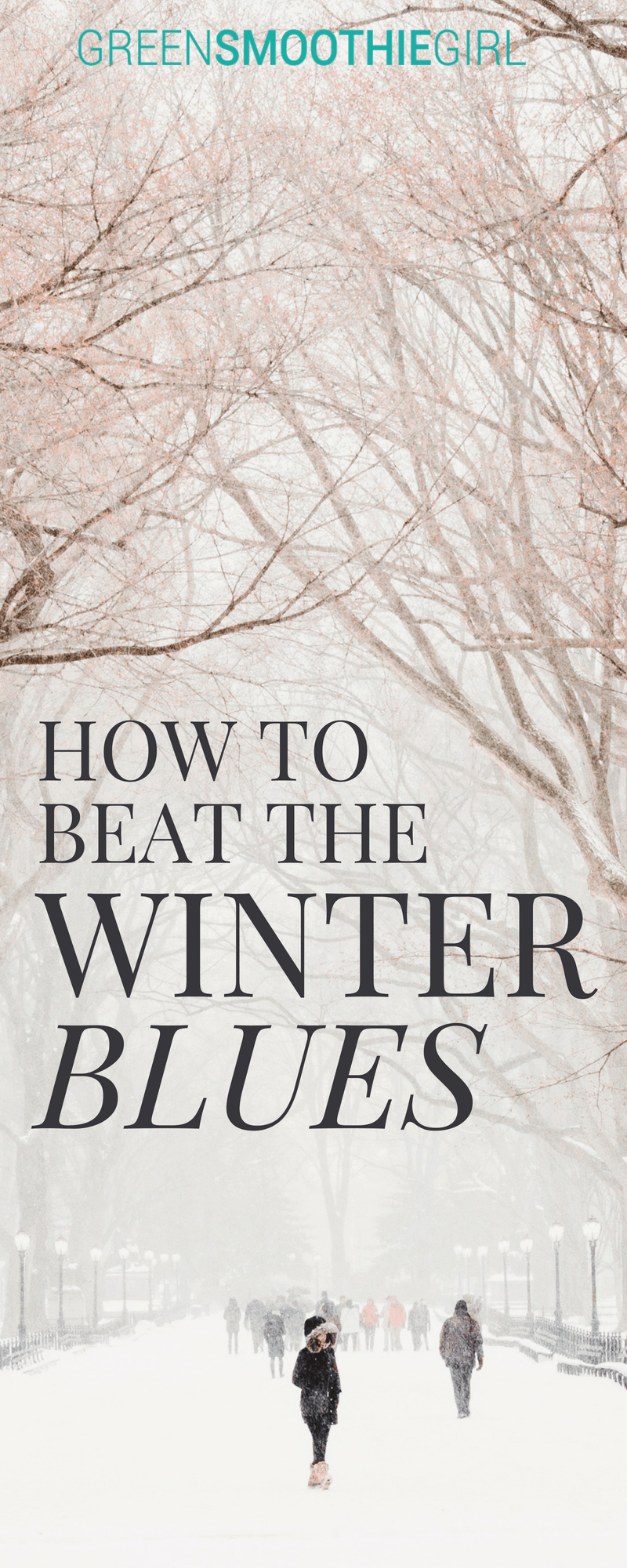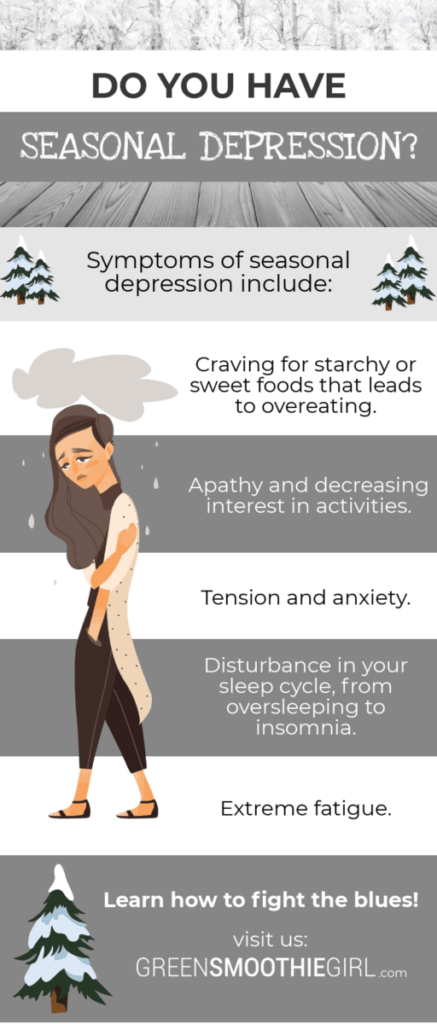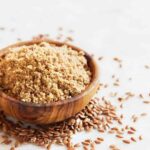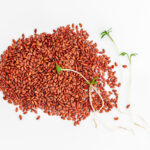How You Can Beat the Winter Blues and Stay Happy Using Natural Methods

Winter is officially upon us, declaring its arrival with sub-zero temperatures. It’s time to share a few tips—some natural methods, products, and nutritional remedies to beat the “winter blues.”
We’ve got three months until spring … we can do this.
In this article:
- Seasonal Depression? The Effects of Winter Light
- Symptoms of Seasonal Depression
- Light Therapy
- Color Therapy
- Plant Therapy
- Vitamin D
- Food Therapy
- Best Supplements for Seasonal Depression
- Exercise
- Touch Therapy
- Melatonin and Sleep
Seasonal Depression? The Effects of Winter Light
This time of year affects everyone a little differently. You might not notice any change at all, or you may feel a little ache, like the loss of a good friend that’s moved away—that good friend being warmth and sunshine.
On the more extreme end of the spectrum, you may be part of the 5% of the U.S. population that experiences full-blown seasonal depression, otherwise known as Seasonal Affective Disorder (SAD). A milder form of this type of depression is experienced by approximately 10-20% of Americans.
Symptoms of seasonal depression include:
- Apathy and decreased interest in activities
- Tension and anxiety
- Disturbance in your sleep cycle, from oversleeping to insomnia
- Extreme fatigue
- Cravings for starchy or sweet foods that lead to overeating
The human organism was meant to be outside, and sunshine is one of the greatest antidepressants. When sunshine is harder to come by during the darker, colder months of the year, it’s important to be aware of your changing moods and take some steps to relieve your anxiety before it gets entrenched. Here are a few tried and true remedies.
Light Therapy
I live in a snowy state (5 minutes from a ski resort, in fact), but I work at home and position my desk where I can open the blinds and get sunlight through the windows on sunny days during the winter. Sometimes I take off everything but shorts and a tank top and stand in front of the window, soaking in all the sunlight I can get for 10 minutes.
Remember, Vitamin D is one of the hormonal factors you can “bank.” In other words, you don’t have to get it every day in order for it to be helpful; if you get a lot of Vitamin D on Monday, you’ll still be feeling the effects of it on Tuesday and Wednesday.
If diminishing daylight hours is a problem for you, you may want to consider investing in artificial light therapy. Unfortunately, most light boxes use full-spectrum fluorescent lights at an intensity of 10,000 lux. So, while getting bathed in a sea of light, you are also exposing yourself to a bath of electromagnetic radiation.
If possible, plan two short vacations to sunny places during the winter. You can also put on your snowshoes or winter boots and enjoy a jaunt through the sparkling snowflakes; it may be colder outside, but lower temperatures don’t completely rule out the positive effects of sunshine!
Color Therapy
If below-freezing temperatures make the outdoors relatively painful, consider “designing” your way out of the blues by painting the walls of your home and office. I’ve painted my bedroom yellow in my last three homes, and it makes me happy!
When choosing your palette, think the opposite of the blues and grays of winter and spruce up your walls with the bright colors of a tropical sunset. A golden glow or earthy colors can also promote a feeling of peace and warmth.
Plant Therapy
Bring the outdoors in with one of the best reminders of spring—plants! Dracaenas and palms do well indoors. Better yet, buy some bulbs and fill your home with flowers. Amaryllis and paperwhite narcissus are beautiful choices as well as crocus, hyacinths and mini-daffodils. Put them where you spend most of your time.

Now that you’ve set the stage in your physical surroundings, let’s look at what’s happening inside your body and how we can bring a little “happy” back.
Vitamin D
Just as plants require sunlight to produce life-sustaining oxygen, we, as humans, require sunlight to produce Vitamin D. In fact, we derive only about 10 percent of this vitamin from our food. Vitamin D promotes the production of serotonin, a hormone that plays a central role in regulating our moods.
So how do we get more Vitamin D into our systems when the days are shorter and we’re keeping so much of our skin covered up? Keep an eye out for that ray of sun shimmering in between the trees, and make spending some time in it a priority. Believe it or not, the sun is not vanquished by the coming of winter! We just don’t have the same inclination to bask in its rays when temperatures are in the teens.
Did you know that after you go in the sun, your body needs a few hours to convert the substances collected on your skin to Vitamin D in the body? So after any sun exposure you can get, don’t take a shower for several hours. This will go a long way towards giving you a positive, upbeat mood and high productivity.
Depending on your location and the time of day, the sunlight may not be direct enough to synthesize into Vitamin D. Here’s a great test the Linus Pauling Institute recommends: measure your shadow. If it's the same height or shorter than you, you can get enough sun, but if your shadow is taller than you are, the sunlight isn’t quite strong enough to give you the vitamin D you need.
And remember, sunlight is also needed for the health of your hypothalamus (the gland in your brain responsible for sleep, mood, and appetite). It needs sufficient levels of daily natural light through your eyes to stimulate and regulate it, so spend some time outside each day with your sunglasses off.
Food Therapy
Yes, you can eat your way to happiness, but no, potato chips are not the answer. (Sorry!)
Tryptophan, an essential amino acid found in food, is a precursor to serotonin. Because of this, many people have been mistakenly loading up on turkey and other animal proteins such as eggs and beef with the intention of boosting their serotonin levels. Don’t do that! Studies comparing animal-protein meals vs. carbohydrate meals show that brain tryptophan levels go up after carb-rich meals, but down after protein-rich meals. Why? Because tryptophan requires carbs to transport it across the blood-brain barrier. (Think healthy, whole-food carbs, like fresh fruits and vegetables or whole grains.)
When you’ve got the blues and reach for a chocolate bar to make yourself feel better, you may think that your body is in self-sabotage mode. Not so fast! The truth is that your body is smart; it knows that sugar produces insulin, which helps tryptophan get from the gut to the brain.
Skip the processed carbs, though; you want to get complex carbs from whole foods like greens, legumes, and sprouted nuts and seeds, or whole-foods carbs with simple sugars and also lots of fiber and nutrients, like a piece of fruit.
You also need nutrients from whole foods to keep your gut microbiome healthy, since tryptophan is synthesized by the good bacteria in your gut.
More happy winter foods include those with Vitamin D, like mushrooms and organic eggs, but don’t rely on them in place of sunlight; in the winter when sunlight is harder to come by, you will probably need to supplement (more on that later).
You should also consider green tea in your mood-boosting diet. Green tea contains L-Theanine, an amino acid that has been shown to increase serotonin levels in the brain.
Supplements
Vitamin D
You will probably find it difficult to get the amount of Vitamin D that you need from the sun and food during the winter months.
Over 80% of North Americans are chronically deficient in Vitamin D, and not only does this affect your wintertime mood; it massively increases cancer risk as well!
The most assimilable forms will be in olive oil capsules, rather than hard pills. And make sure it’s D3, not D2! Best of all is an oil-based D3 with Vitamin K added, for best absorption.
Probiotics
You should also take a probiotic, preferably with prebiotics and enzymes. The exploding research on microbiome diversity shows that mental health relies on gut health.
Your gut bacteria are responsible for making all the hormones that modulate mood, sleep, weight, mental energy, and even pain, so keep them healthy with a good supplement.
Omega-3s
Omega-3-fatty acids have also been shown to be a key component when treating the winter blues. Don’t get yours from polluted, rancid fish sources!
Instead, you can add sprouted, ground flaxseed to your smoothies, batters, and other foods. Like probiotics, you need omega-3s all year round, but be especially vigilant in wintertime.
Curcumin
Curcumin, the active ingredient in the herb turmeric, has been a popular supplement for its strong anti-inflammatory and antioxidant properties, but it also helps increase serotonin production.
SAM-e
Many SAD sufferers have also gotten relief by supplementing with SAM-e (S-Adenosyl-Methionine), a naturally-occurring compound that helps produce and regulate hormones.
Exercise
It’s easy to let the weather put a damper on your exercise routine. If you make 30 to 45 minutes of low-intensity exercise every day a priority in your life, you’ll be amazed at the changes you feel in both your body and mind.
Exercise is an important way to release those feel-good chemicals, serotonin and dopamine. If it’s just too cold outside and winter hiking is not your thing, find other options to get your sweat on indoors.
Touch Therapy
Most of you know about the power of touch, particularly therapeutic touch. The energetic exchange we get from other human beings cannot be overestimated, and if you aren’t getting that from an intimate relationship, make sure you’re getting it somewhere!
Massages, for example, have been shown to release serotonin. The University of Miami School of Medicine conducted a study that showed a 28% increase of serotonin and a 31% decrease of cortisol (a hormone associated with stress) after a massage.¹
Massage has also been shown to release oxytocin, our “love” and “trust” hormone.
Melatonin and Sleep
It’s hard to be happy if you’re groggy and tired most of the time. Melatonin is the hormone that plays an important part in our sleep/wake cycle. Daytime sun limits its production, while darkness sends the message that it’s time for melatonin to increase.
Seasonal changes in light exposure have been shown to disrupt the normal ebb and flow of this powerful hormone in your body.
Researchers at Oregon Health and Science University placed 68 patients suffering from SAD into three groups, two of which received low doses of melatonin. Their conclusion? Melatonin can relieve the doldrums of winter depression.
If you still find yourself feeling the blues after trying these natural approaches, don’t hesitate to reach out for support. Talking to someone who understands what you are going through can bring awareness and camaraderie. Join a Meetup group, related to any interest you might have, and try not to be alone, too much, during the winter.
Whatever you do, don’t isolate yourself.
Remember the words of Edna Jaques when the walls begin to close in:
“Go out, go out I beg of you. And taste the beauty of the wild. Behold the miracle of the earth. With the wonder of a child.”


Sources
1. Field T, et al. Cortisol decreases and serotonin and dopamine increase following massage therapy. Touch Research Institutes, University of Miami School of Medicine. tfield@med.miami.edu.
2. Lansdowne, AT. Et al. Vitamin D3 enhances mood in healthy subjects during winter. Psychopharmacology. 02/1998. https://www.ncbi.nlm.nih.gov/pubmed/9539254
3. Michels, Alexander PhD. Can you rely on sunlight to get enough vitamin D this winter? Linus Pauling Institute. 01/2016. http://blogs.oregonstate.edu/linuspaulinginstitute/2016/01/25/sunlight-vitamin-d-winter/
4. World Happiness Report. United Nations. 2017. http://worldhappiness.report/
5. Altshul, Sara. Natural Ways to Beat the Winter Blues. Health 03/2013. http://www.health.com/health/article/0,,20428713,00.html
6. Weil, Andrew Dr. Is SAMe Worthwhile for Depression? Weil. 11/2011.
7. Melatonin Improves Mood in Winter Depression. ScienceDaily. 05/2006. https://www.sciencedaily.com/releases/2006/05/060501113832.htm
Disclosure: This post may contain affiliate links that help support the GSG mission without costing you extra. I recommend only companies and products that I use myself.
Disclosure: This post may contain affiliate links that help support the GSG mission without costing you extra. I recommend only companies and products that I use myself.
Posted in: 12 Steps To Whole Food, Exercise, High-Vibe Living, Mind/Body Connection, Natural Remedies, Stress Management
















